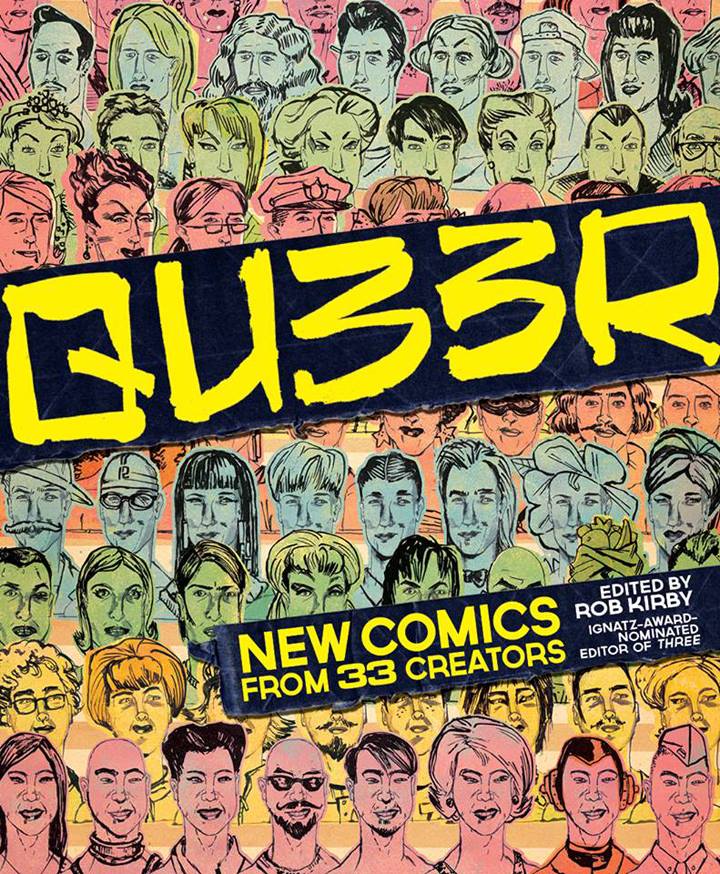 I’m very excited by some of the anthology projects I have coming up. There’s QU33R, of course, which is supposed to drop next month from Northwest Press (more on that when I know the official release date). I’m also going to be a part of Beyond, an all-queer sci-fi/fantasy anthology that will be coming out next year. Beyond is currently soliciting proposals, so check out the FAQ and guidelines if you wanna submit.
I’m very excited by some of the anthology projects I have coming up. There’s QU33R, of course, which is supposed to drop next month from Northwest Press (more on that when I know the official release date). I’m also going to be a part of Beyond, an all-queer sci-fi/fantasy anthology that will be coming out next year. Beyond is currently soliciting proposals, so check out the FAQ and guidelines if you wanna submit.
Also, I don’t remember if I mentioned this here or not, but No Straight Lines from Fantagraphics is back in print in softcover, so snag this amazing tome of jillions of queer comics if you haven’t already.
All this anthology talk has me ruminating on the relationship between creator and editor. I think it’s relatively rare, especially in the age of webcomics and self-publishing, for comics creators to have an opportunity to work with an editor, whether that’s in the form of being selected for an anthology project, or having your work-in-progress edited by a professional (i.e., not your friends). A couple of comments I have on this process:
1. Be nice to the editor, even if they decline to publish you at this time. Maybe what you do is not suitable for the current project, or maybe it’s already over its page limit and your amazing story is too long, or maybe you didn’t read the specs carefully and the piece you created will not physically fit in the book without looking terrible. It sucks to get turned down! Truly! But bear in mind, it’s not uncommon for anthology editors to do more than one anthology project in their lives. Maybe you will be a perfect fit for the next project. If you haven’t burned your bridges, the editor might think of you later and be all, “Oh, hey, wanna be in my next anthology?”
But if you are rude to an editor, even if your work is amazing, you will have a hard time getting published if you’ve made a reputation for yourself as someone who is an obnoxious jerk. Especially with an anthology, the editor is already herding cats trying to get the other artists to get their stuff in on time (ha ha). Unless you are such a huge draw that your name alone will sell a ton of books (hint: you’re probably not), an editor is likely to pass you over for someone whose work is equally as good, but who is also not a giant pain in the ass to work with.
Editors are not gods (necessarily). You certainly don’t need to grovel. Just, you know, be nice.
2. Do not take edits personally. This happens a lot in prose, and would happen more in comics if more comic book people actually got a chance to work with a professional editor. Unlike your pal, who doesn’t want to hurt your feelings and is not getting paid to critique you, a professional editor’s job is to highlight the weaknesses in your piece so you can fix them. (A good editor will preface the coming bloodbath with some words of praise for the stuff you’re doing really well.) In general, you are not actually obligated to make all the edits (unless you need to make something age appropriate, for example), but ask yourself if you feel strongly enough about the work as-is to go to the mat for it. And if you’re defending it, can you make a case for why your version is better.
My own experience working with professional editors was that, while being edited sometimes made me grumpy (I AM AN AAAAAAHTIST), the editors were right probably 95% of the time. And by taking their criticisms seriously, I saw the quality of my work level up considerably. There were a handful of instances where I felt motivated to defend my original version, but for the most part I found that the professionals were right. (You can, it turns out, hire a freelance editor to look at your project if you’re planning to self-publish. If you’ve never done this before, seriously, give it a try sometime.)
Cheers,
Dylan
